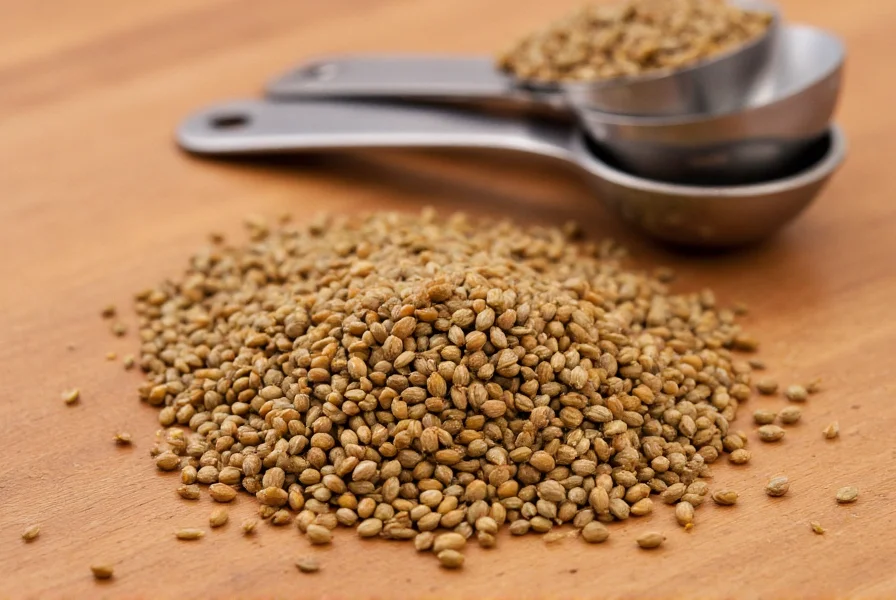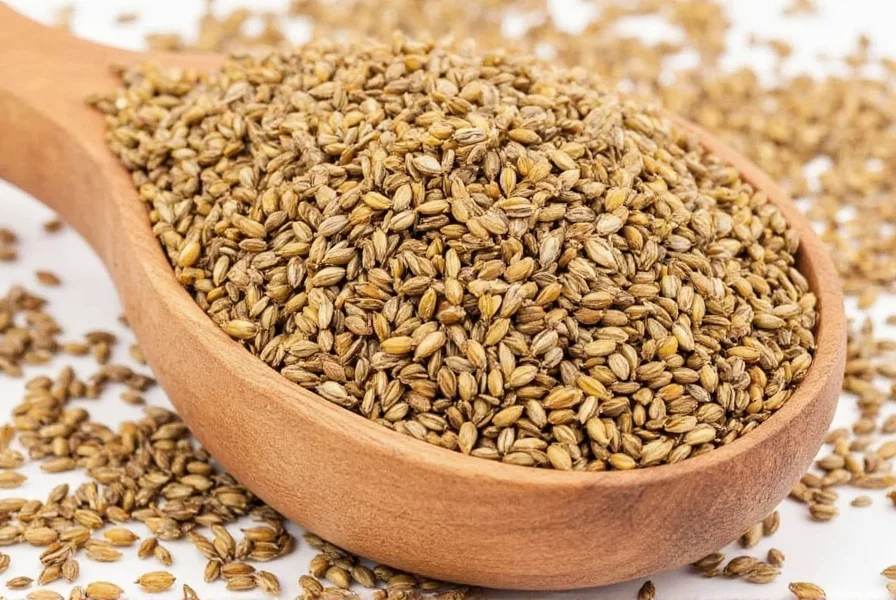Cumin seeds (Cuminum cyminum), a staple in global cuisines for thousands of years, deliver remarkable health advantages backed by modern research. This ancient spice contains potent compounds that interact with multiple body systems to promote wellness. Understanding the evidence-based benefits of cumin seeds helps you make informed decisions about incorporating this powerful spice into your daily routine.
Nutritional Powerhouse: What Makes Cumin Special
Beyond their distinctive flavor, cumin seeds contain essential nutrients and bioactive compounds. Just one tablespoon (6g) provides:
| Nutrient | Amount per Tbsp | % Daily Value |
|---|---|---|
| Iron | 1.4 mg | 8% |
| Manganese | 0.3 mg | 14% |
| Magnesium | 29 mg | 7% |
| Calcium | 35 mg | 3% |
| Dietary Fiber | 0.6 g | 2% |
The real magic happens through bioactive compounds like cuminaldehyde, thymol, and flavonoids. These antioxidant properties of cumin seeds combat oxidative stress, potentially reducing chronic disease risk. Unlike many supplements, cumin delivers these benefits through whole-food consumption, enhancing bioavailability.

Science-Backed Health Benefits of Cumin Seeds
1. Enhanced Digestive Function
Cumin seeds stimulate digestive enzymes that break down fats and carbohydrates. A 2018 study in Complementary Therapies in Medicine found participants with indigestion who consumed cumin extract reported significant improvement in symptoms like bloating and abdominal pain. The carminative properties explain why many cultures serve cumin-infused water after meals. For those exploring cumin seeds for digestion, try steeping one teaspoon of seeds in hot water for 10 minutes.
2. Blood Sugar Regulation Support
Research indicates cumin may improve insulin sensitivity. A clinical trial published in Nutrition Research showed type 2 diabetes patients who consumed 75mg of cumin extract daily experienced reduced fasting blood glucose and HbA1c levels compared to placebo. While not a replacement for diabetes medication, incorporating cumin seeds blood sugar regulation strategies through culinary use shows promise as a complementary approach.
3. Potent Antioxidant Protection
Cumin ranks high on the ORAC (Oxygen Radical Absorbance Capacity) scale, measuring antioxidant capacity. Its compounds neutralize free radicals that damage cells. A comparative analysis in Food Chemistry revealed cumin's antioxidant activity surpasses many common spices. Regular consumption of health benefits of roasted cumin seeds provides cumulative protection against oxidative stress, potentially slowing aging processes and reducing chronic disease risk.
4. Cholesterol Management
Multiple studies demonstrate cumin's positive impact on lipid profiles. Research in Annals of Nutrition and Metabolism found participants consuming cumin powder daily showed significant reductions in LDL ("bad") cholesterol and triglycerides. The mechanism appears related to cumin's ability to enhance bile production, which helps metabolize fats. For those investigating how to use cumin seeds for weight loss, this cholesterol benefit contributes to cardiovascular health during weight management.
5. Iron Source for Anemia Prevention
With 1.4mg of iron per tablespoon (8% DV), cumin serves as a valuable plant-based iron source. While non-heme iron from plants has lower absorption than animal sources, pairing cumin with vitamin C-rich foods boosts uptake. This makes cumin seeds nutritional value particularly important for vegetarians, vegans, and menstruating women at higher risk of iron deficiency. Sprinkling cumin on roasted vegetables creates a synergistic nutrient combination.
6. Anti-Inflammatory Effects
Chronic inflammation underlies many diseases, and cumin's bioactive compounds demonstrate significant anti-inflammatory activity. A 2020 review in Phytotherapy Research highlighted cumin's ability to inhibit inflammatory markers like TNF-α and IL-6. These effects may explain traditional uses of cumin for arthritis and joint pain. The cumin seeds anti-inflammatory properties work through multiple pathways, making it a versatile natural anti-inflammatory agent.
7. Antimicrobial Activity
Cumin essential oil shows broad-spectrum activity against bacteria, viruses, and fungi. Research in Frontiers in Microbiology demonstrated effectiveness against foodborne pathogens like E. coli and Salmonella. While culinary use won't replace antibiotics, incorporating cumin into food preparation provides natural food safety benefits. This explains why many traditional food preservation methods include cumin.

Traditional Uses vs. Scientific Evidence
Ayurvedic and traditional medicine systems have used cumin for centuries to treat digestive issues, respiratory conditions, and skin problems. Modern research validates many traditional claims, particularly regarding digestion and inflammation. However, some traditional uses like cumin for lactation enhancement lack robust clinical evidence. When exploring cumin seeds traditional benefits, distinguish between well-supported effects and areas needing more research.
Practical Ways to Incorporate Cumin Seeds
Maximize benefits by using cumin in these evidence-based ways:
- Dry roasting: Enhances flavor and increases bioactive compound availability
- Tempering: Heating seeds in oil releases fat-soluble compounds
- Infused water: Steep 1 tsp seeds in hot water for digestive support
- Spice blends: Combine with turmeric and black pepper for enhanced absorption
- Seed sprinkles: Add to roasted vegetables, soups, or salads
Potential Side Effects and Considerations
Cumin is generally safe when consumed in culinary amounts. However, some cumin seeds side effects may occur with excessive consumption or supplementation:
- Heartburn or acid reflux in sensitive individuals
- Potential blood-thinning effects at very high doses
- Rare allergic reactions, particularly in those sensitive to parsley or carrots
- Possible interactions with diabetes medications (monitor blood sugar closely)
Pregnant women should avoid medicinal amounts but can safely consume cumin as a spice. Always consult your healthcare provider before using cumin therapeutically, especially if managing chronic conditions.
Conclusion: Harnessing Cumin's Power Safely
Cumin seeds offer multiple evidence-based health advantages when incorporated into a balanced diet. Their digestive, antioxidant, and metabolic benefits make them valuable for overall wellness. While not a miracle cure, regular culinary use provides cumulative health support. Focus on whole-seed consumption rather than isolated supplements to maximize benefits while minimizing potential risks. As with any dietary change, consistency matters more than quantity when seeking the real health benefits of cumin seeds.
Frequently Asked Questions
What is the best way to consume cumin seeds for maximum benefits?
Dry roasting cumin seeds before use enhances both flavor and bioavailability of active compounds. For digestive benefits, steep one teaspoon of seeds in hot water for 10 minutes to make cumin tea. Adding cumin to oil-based dishes helps absorb fat-soluble compounds. Consuming 1-2 teaspoons daily as part of meals provides optimal benefits without risk of side effects.
Can cumin seeds help with weight loss?
Research suggests cumin may support weight management through multiple mechanisms including improved digestion, enhanced metabolism, and potential effects on fat storage. A study in Complementary Therapies in Medicine found participants taking cumin supplements lost more weight than the control group. However, cumin works best as part of a comprehensive approach including balanced diet and regular exercise, not as a standalone weight loss solution.
How much cumin should I consume daily for health benefits?
For general health benefits, 1-2 teaspoons (3-6 grams) of cumin seeds daily provides sufficient bioactive compounds without risk of side effects. This amount can be incorporated into cooking, teas, or spice blends. Therapeutic doses used in studies typically range from 300-750mg of concentrated extract, but culinary use of whole seeds is safer for regular consumption. Excessive amounts (more than 1 tablespoon daily) may cause digestive discomfort in some individuals.
Are roasted cumin seeds more beneficial than raw seeds?
Dry roasting cumin seeds actually increases the bioavailability of certain beneficial compounds while enhancing flavor. The heating process breaks down cell walls, making antioxidants more accessible. However, excessive roasting at high temperatures can degrade some heat-sensitive compounds. Light to medium roasting (until fragrant, about 2-3 minutes in a dry pan) provides the optimal balance, maximizing the health benefits of roasted cumin seeds while preserving nutritional value.
Can cumin seeds lower blood sugar levels significantly?
Research indicates cumin may help regulate blood sugar by improving insulin sensitivity, but the effect is moderate. Clinical studies show reductions in fasting blood glucose of approximately 10-15% with regular consumption. Cumin should not replace diabetes medication but can serve as a complementary approach. Those with diabetes should monitor blood sugar closely when adding significant amounts of cumin to their diet and consult their healthcare provider about potential interactions with medications.











 浙公网安备
33010002000092号
浙公网安备
33010002000092号 浙B2-20120091-4
浙B2-20120091-4